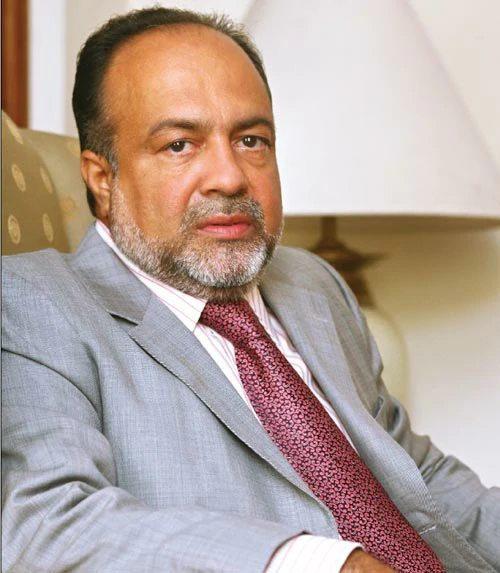
As a leading freight forwarding company in South Asia, HTL Logistics has grown from humble beginnings almost three decades ago to a company that had a turnover of over fifty two million US$ at the end of the 2008/09 financial year, and represented by agents around the world. Reyaz Farook, Chairman, HTL Logistics, speaks of the massive growth achieved by the organisation as well as the potential for logistics to be a thriving component of the new era of prosperity that is around the corner for the Sri Lankan economy.
By Ayesha Inoon
In 1979, when Farook investigated the possibilities of launching a freight forwarding business, the field was still in its infancy in Sri Lanka. There were only a limited number of operating airlines in the country, as well as ships that were coming in; therefore there was a high demand for cargo space. Realising the capacity and potential for the forwarding industry, he approached Herman Ludwig, a German organisation, who agreed to appoint a non exclusive agent in the country. Thus, the initial operation of international freight forwarding was established under the name Air Express Consolidators (AEC).
Within a few months several agencies from various countries appointed Farook as an agent. Of these, one was Hecny Transportation, an agent from the Far East. Hecny specialised in handling forwarding with the apparel sector, which was just beginning to take off in Sri Lanka at that time. AEC was handling some of the largest apparel accounts, including Mast, Macy’s, Polo and Ralph Lauren. It was then that Hecny consolidated with AEC to establish Hecny Transportation Sri Lanka in 1982. This was followed by the setting up of Hecny Freight India, Hecny Transport Pakistan (Pvt) Ltd in Pakistan, Hecny Transportation Bangladesh and Challenger International Cargo (CIC) in Dubai. In just a few years, says Farook, Hecny Transportation was the leading forwarding player in the Sri Lankan market.
The organisation was the second foreign freight forwarder to be opened in India, and by 1990, had become the largest sub continental Indian company. Although the company was liquidated in 1999 due to a shareholders’ dispute, it was once again restructured in India, Bangaladesh, Maritius and Dubai under the name, HTL Logistics.
Today, HTL has offices in the main gateways of Delhi, Mumbai, Hyderabad, Bangalore and Chennai as well as other satellite offices in various Indian cities, with over a thousand customers in the Indian market alone. “We have offices in Pakistan, Bangladesh, China and partnership arrangements in Hong Kong, Egypt, Indonesia, Jordan, Madagascar, Mauritius, Singapore and Nepal. We have a registered office in the USA as well and our own FMC license,” says Farook, adding that they are working on bringing the Colombo office under the HTL name as well. “In India we had an annual turnover of approximately forty three and a half million US$ at the end the 2008/09 financial year. My aim is to make this one of the strongest companies in South Asia, the Middle East and part of Africa as well.”
The prime commodities handled by HTL are pharmaceuticals, garments, including Garments on Hangers (GOH), electronic items, toys, automobile and engineering equipment. The Company has also provided value added services in transporting perishables including tuna fish to Japan. Many of those who received their initial training under Reyaz Farook are now holding leading positions in the forwarding industry worldwide.
Farook also played a pioneering role in the establishment of the Forwarders’ Association, of which he was Chairman for four consecutive years. During this time he approached other members of the association to open a cargo complex which would be operated by all the forwarders with each one holding shares. This turned out to be a very successful profitable venture.
“Since then the forwarding industry has grown and brought in a large amount of foreign exchange to Sri Lanka,” reflects Farook, pointing out that they were able to attract many foreign buyers to place orders or to buy from Sri Lanka since the total logistics industry was brought to a professional level through the Association.
Commending President Mahinda Rajapksa’s initiative in developing the Hambantota Port, Farook believes that this will give the impetus for the logistics industry to grow even further. Not only will ships be able to save on sailing time geographically, thereby saving fuel, this port will also reduce the congestion in the Colombo Port, he says. “I believe that with this we can attract South India, and become to it, what Hong Kong is to China.”
Furthermore, trading houses will be able to store goods in warehouses under bonds in Sri Lanka. This, he explains, will enable the moving of goods to the ultimate industry users within 2-3 days and these strategic benefits will boost trade by their significance to the trade route between Sri Lanka and India. “The Colombo Airport too can be a hub for transshipment and this is also greatly beneficial for trade between India and Sri Lanka.”
The shipping and logistics industries are closely related, points out Farook – one cannot survive without the other. “It is a people-oriented business and requires your constant attention,” he says, adding that as the global economic recession begins to lose its impact, there will be much competition in the market, and Sri Lanka must be ready to face that challenge.





